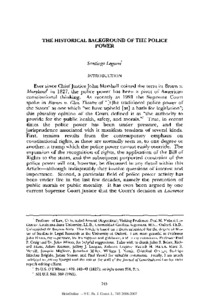Por favor, use este identificador para citar o enlazar este ítem:
https://repositorio.uca.edu.ar/handle/123456789/10414| Campo DC | Valor | Lengua/Idioma |
|---|---|---|
| dc.contributor.author | Legarre, Santiago | es |
| dc.coverage.spatial | Estados Unidos | es |
| dc.date.accessioned | 2020-07-24T13:45:48Z | - |
| dc.date.available | 2020-07-24T13:45:48Z | - |
| dc.date.issued | 2007 | - |
| dc.identifier.citation | Legarre, S. The historical background of the police power [en línea]. University of Pennsylvania Journal of Constitutional Law. 2007, 2007, 9. Disponible en: https://repositorio.uca.edu.ar/handle/123456789/10414 | es |
| dc.identifier.issn | 1521-2823 | - |
| dc.identifier.uri | https://repositorio.uca.edu.ar/handle/123456789/10414 | - |
| dc.description.abstract | Introduction: Ever since Chief Justice John Marshall coined the term in Brown v. Mmyland in 1827, the police power has been a pivot of American constitutional thinking. As recently as 1991 the Supreme Court spoke in Barnes v. Glen Theatre of "[t] he traditional police power of the States" as one which "we have upheld [as] a basis for legislation"; this plurality opinion of the Court defined it as "the authority to provide for the public health, safety, and morals." 2 True, in recent times the police power has been under pressure, and the jurisprudence associated with it manifests tensions of several kinds. First, tension results from the contemporary emphasis on constitutional rights, as these are normally seen as, to one degree or another, a trump which the police power cannot easily override. The expansion of the recognition of rights, the application of the Bill of Rights to the states, and the subsequent purported constraint of the police power will not, however, be discussed in any detail within this Article-although indisputably they involve questions of interest and importance. Second, a particular field of police power activity has been under fire in the last few decades, namely the promotion of public morals or public morality. It has even been argued by one current Supreme Court Justice that the Court's decision in Lawrence v. Texas3 effectively means that the police power regarding public morality is being eliminated . Although the topic undoubtedly calls for attention, the implications of Lawrence v. Texas and of other cases in which provisions of morals legislation were struck down are outside the object of the present inquiry. Third, it is clear that modern constitutional scholarship, with its characteristic preference for rights, pays less attention to the police power than was the case in earlier times. A cursory glance at the tables of contents of the most authoritative constitutional law treatises and case books reveals the near absence of the entry "police power,"5 which stands in stark contrast to the extensive treatment of the topic by earlier constitutional scholars.6 Again, this Article will not consider the reasons for what seems to be a trend away from the study of the police power... | es |
| dc.format | application/pdf | es |
| dc.language.iso | eng | es |
| dc.publisher | University of Pennsylvania Law School | es |
| dc.rights | Acceso abierto | * |
| dc.rights.uri | http://creativecommons.org/licenses/by-nc-sa/4.0/ | * |
| dc.source | University of Pennsylvania Journal of Constitutional Law. Año 2007, Vol. 9, 2007 | es |
| dc.subject | PODER DE POLICIA | es |
| dc.subject | DERECHO CONSTITUCIONAL | es |
| dc.subject | ANTECEDENTES HISTORICOS | es |
| dc.title | The historical background of the police power | es |
| dc.type | Artículo | es |
| uca.disciplina | DERECHO | es |
| uca.issnrd | 1 | es |
| uca.affiliation | Fil: Legarre, Santiago. Pontificia Universidad Católica Argentina. Facultad de Derecho; Argentina | es |
| uca.affiliation | Fil: Legarre, Santiago. Consejo Nacional de Investigaciones Científicas y Técnicas; Argentina | es |
| uca.affiliation | Fil: Legarre, Santiago. Universidad Austral. Facultad de Derecho. Departamento de Filosofía del Derecho y Derecho Constitucional; Argentina | es |
| uca.version | publishedVersion | es |
| item.grantfulltext | open | - |
| item.fulltext | With Fulltext | - |
| item.languageiso639-1 | en | - |
| crisitem.author.dept | Facultad de Derecho | - |
| crisitem.author.dept | Programa IUS | - |
| crisitem.author.dept | Consejo Nacional de Investigaciones Científicas y Técnicas | - |
| crisitem.author.orcid | 0000-0002-7348-9607 | - |
| crisitem.author.parentorg | Pontificia Universidad Católica Argentina | - |
| crisitem.author.parentorg | Facultad de Derecho | - |
| Aparece en las colecciones: | Artículos | |
Ficheros en este ítem:
| Fichero | Descripción | Tamaño | Formato | |
|---|---|---|---|---|
| historical-background-police-power.pdf | 3,22 MB | Adobe PDF |  Visualizar/Abrir |
Visualizaciones de página(s)
173
comprobado en 30-abr-2024
Descarga(s)
416
comprobado en 30-abr-2024
Google ScholarTM
Ver en Google Scholar
Este ítem está sujeto a una Licencia Creative Commons

